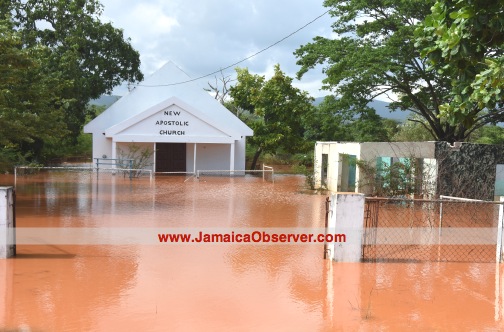Heavy, persistent rain caused by a trough in the vicinity of Jamaica over the weekend brought disaster to sections of south-east Clarendon Saturday.
Yesterday, when the Observer visited the communities of Mineral Heights, 19 Miles/Palmetto Pen, Palmer’s Cross, Swansea and Toll Gate, evidence of extensive flooding could be seen by virtue of watermarks on the walls of houses, opened vehicles, mattress and other furniture and appliances strewn on lawns, along with clothing hung out to dry .
Davian Barnes, a resident of Bauxite Crescent in Mineral Heights, explained that his ordeal began as he made his way back to Clarendon from a funeral in Manchester on Saturday and had to manoeuvre his way through flooded roads in Clarendon Park and Toll Gate.
But, by the time he got home, Barnes said vehicles in his community were covered and the volume of water entering his home was frightening.
“The entire van was covered, and out by Mineral Heights Boulevard was flooded. We had to open up the manholes in the yard so the water could run out,” he said.

However, Barnes pointed out that the decision only compounded the problem as the water came up through his toilets and bathtubs.
His neighbours had a similar experience. Isoline Budhoo explained that she had to plug her bathtub to prevent an overflow.
For Michael Bryant, though the cement blocks erected at his doorway prevented flooding, water entered his house from beneath his floor.
“It came through the sewage line and came up through the foundation. As a result, I had to put my furniture and appliances on blocks to prevent them from being damaged,” he said.
Further down in Mineral Heights a small team of men, led by Delbert Lee, cleared tree roots, sand and silt from drains.
Lee explained that because there was no clear indication that the rain had completely stopped, they were taking the necessary precautions to avoid a repeat of Saturday’s ordeal.
In 19 Miles, residents were busy washing the interior of two houses and the Palmetto Seventh-day Adventist Church that was badly affected as flood waters almost covered the buildings.
Ruby and Marlene Patterson, whose bar and grocery store was flooded, tried to maintain their composure as they pondered how they would start over, having lost all their goods.
“I have no idea what will happen. This is a tough one, but what to do. Right now we’re desperate as we lost everything, but we just a gwan hold it,” Marlene said.
In Swansea, Jacqueline Martin’s home was still in knee-deep water. She explained that her family members had to be relocated.
“It’s seven rooms and 17 of us. All our clothes, appliances are wet or damaged. The water came down very fast, so there’s not much we could have done,” she said.
In Toll Gate, Kurt Bowie’s story was no different, but he argued that the drainage and development taking place in Clarendon were not in tandem.
“Whenever you have major development going on you have to anticipate this, and the gullies and drains could not handle the level of sand, silt and water coming down. We have to move to address this or else it will be repeated,” he said.
Similar sentiments were expressed by Stephen Shaw, director of communications at the National Works Agency (NWA).
“The drainage systems were overwhelmed and could not handle the volume of water that came with the rains on Saturday,” Shaw said.
That point was made by Prime Minister Andrew Holness who said the flooding could be attributed to the country’s lack of capacity to deal with these extraordinary weather events.
“We have an extraordinary weather event that is causing problems on our decades-old drainage system. As a country, our development has not kept pace with our ability to deal with run-off, solid waste management and other environmental issues,” Holness said in a news release. “Added to that, past administrations have not managed the development process effectively to ensure that the increased capacity of the drainage systems matches the level of physical development. We now must develop a programme to expand and manage the country’s infrastructure to deal with such extraordinary weather events.”
As such, he said the Government will take a closer look at the management and approval process for developments in the country.
Meanwhile, Opposition Leader Dr Peter Phillips, who toured the affected areas yesterday, said while he and his team were trying to assess the level of damage and ascertain why it was so bad, it was obvious that drain cleaning was a problem, despite the payment of $17 million to address that issue.
However, Robert Morgan, director of communications at the Office of the Prime Minister, refuted the claim of blocked drains and said “no amount of drain cleaning could have prevented what took place in Clarendon yesterday”.
The NWA’s Shaw also pointed out that an assessment of the area revealed that majority of the drainage systems were fully cleaned and the main issue was that the drains, gullies and culverts could not handle the volume of water.
He, however, said that teams from the NWA were on the ground clearing blockages to drains where needed, and those activities would be ramped up during the week.










